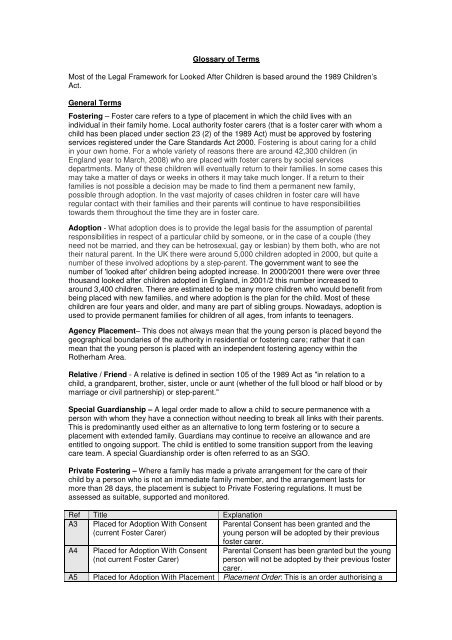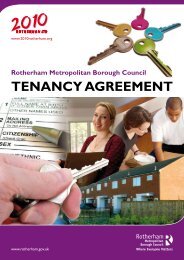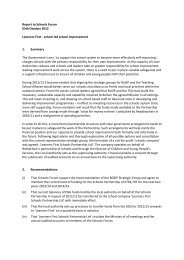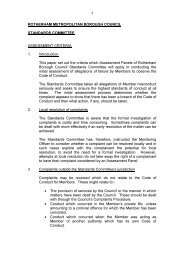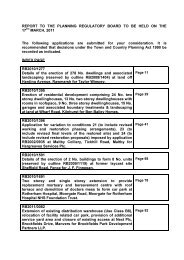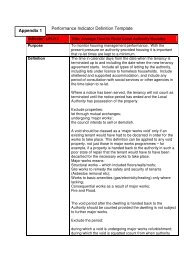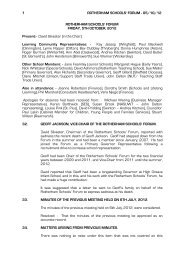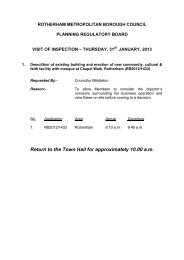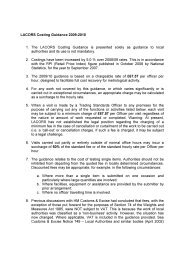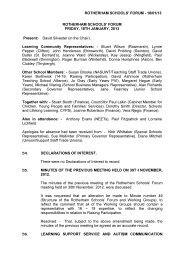Glossary of Terms Most of the Legal Framework for Looked After ...
Glossary of Terms Most of the Legal Framework for Looked After ...
Glossary of Terms Most of the Legal Framework for Looked After ...
You also want an ePaper? Increase the reach of your titles
YUMPU automatically turns print PDFs into web optimized ePapers that Google loves.
<strong>Glossary</strong> <strong>of</strong> <strong>Terms</strong><strong>Most</strong> <strong>of</strong> <strong>the</strong> <strong>Legal</strong> <strong>Framework</strong> <strong>for</strong> <strong>Looked</strong> <strong>After</strong> Children is based around <strong>the</strong> 1989 Children’sAct.General <strong>Terms</strong>Fostering – Foster care refers to a type <strong>of</strong> placement in which <strong>the</strong> child lives with anindividual in <strong>the</strong>ir family home. Local authority foster carers (that is a foster carer with whom achild has been placed under section 23 (2) <strong>of</strong> <strong>the</strong> 1989 Act) must be approved by fosteringservices registered under <strong>the</strong> Care Standards Act 2000. Fostering is about caring <strong>for</strong> a childin your own home. For a whole variety <strong>of</strong> reasons <strong>the</strong>re are around 42,300 children (inEngland year to March, 2008) who are placed with foster carers by social servicesdepartments. Many <strong>of</strong> <strong>the</strong>se children will eventually return to <strong>the</strong>ir families. In some cases thismay take a matter <strong>of</strong> days or weeks in o<strong>the</strong>rs it may take much longer. If a return to <strong>the</strong>irfamilies is not possible a decision may be made to find <strong>the</strong>m a permanent new family,possible through adoption. In <strong>the</strong> vast majority <strong>of</strong> cases children in foster care will haveregular contact with <strong>the</strong>ir families and <strong>the</strong>ir parents will continue to have responsibilitiestowards <strong>the</strong>m throughout <strong>the</strong> time <strong>the</strong>y are in foster care.Adoption - What adoption does is to provide <strong>the</strong> legal basis <strong>for</strong> <strong>the</strong> assumption <strong>of</strong> parentalresponsibilities in respect <strong>of</strong> a particular child by someone, or in <strong>the</strong> case <strong>of</strong> a couple (<strong>the</strong>yneed not be married, and <strong>the</strong>y can be hetrosexual, gay or lesbian) by <strong>the</strong>m both, who are not<strong>the</strong>ir natural parent. In <strong>the</strong> UK <strong>the</strong>re were around 5,000 children adopted in 2000, but quite anumber <strong>of</strong> <strong>the</strong>se involved adoptions by a step-parent. The government want to see <strong>the</strong>number <strong>of</strong> 'looked after' children being adopted increase. In 2000/2001 <strong>the</strong>re were over threethousand looked after children adopted in England, in 2001/2 this number increased toaround 3,400 children. There are estimated to be many more children who would benefit frombeing placed with new families, and where adoption is <strong>the</strong> plan <strong>for</strong> <strong>the</strong> child. <strong>Most</strong> <strong>of</strong> <strong>the</strong>sechildren are four years and older, and many are part <strong>of</strong> sibling groups. Nowadays, adoption isused to provide permanent families <strong>for</strong> children <strong>of</strong> all ages, from infants to teenagers.Agency Placement– This does not always mean that <strong>the</strong> young person is placed beyond <strong>the</strong>geographical boundaries <strong>of</strong> <strong>the</strong> authority in residential or fostering care; ra<strong>the</strong>r that it canmean that <strong>the</strong> young person is placed with an independent fostering agency within <strong>the</strong>Ro<strong>the</strong>rham Area.Relative / Friend - A relative is defined in section 105 <strong>of</strong> <strong>the</strong> 1989 Act as "in relation to achild, a grandparent, bro<strong>the</strong>r, sister, uncle or aunt (whe<strong>the</strong>r <strong>of</strong> <strong>the</strong> full blood or half blood or bymarriage or civil partnership) or step-parent."Special Guardianship – A legal order made to allow a child to secure permanence with aperson with whom <strong>the</strong>y have a connection without needing to break all links with <strong>the</strong>ir parents.This is predominantly used ei<strong>the</strong>r as an alternative to long term fostering or to secure aplacement with extended family. Guardians may continue to receive an allowance and areentitled to ongoing support. The child is entitled to some transition support from <strong>the</strong> leavingcare team. A special Guardianship order is <strong>of</strong>ten referred to as an SGO.Private Fostering – Where a family has made a private arrangement <strong>for</strong> <strong>the</strong> care <strong>of</strong> <strong>the</strong>irchild by a person who is not an immediate family member, and <strong>the</strong> arrangement lasts <strong>for</strong>more than 28 days, <strong>the</strong> placement is subject to Private Fostering regulations. It must beassessed as suitable, supported and monitored.Ref Title ExplanationA3 Placed <strong>for</strong> Adoption With Consent Parental Consent has been granted and <strong>the</strong>(current Foster Carer)young person will be adopted by <strong>the</strong>ir previousA4A5Placed <strong>for</strong> Adoption With Consent(not current Foster Carer)foster carer.Parental Consent has been granted but <strong>the</strong> youngperson will not be adopted by <strong>the</strong>ir previous fostercarer.Placed <strong>for</strong> Adoption With Placement Placement Order: This is an order authorising a
Order (current Foster Carer)A6 Placed <strong>for</strong> Adoption With PlacementOrder (not current Foster Carer)F1 Foster Placement in Local Authority- Relative / FriendF2 Placement in Local Authority -Foster Carer by Local AuthorityF3 Placement in Local Authority -Foster Carer AgencyF4 Foster Placement outside LocalAuthority - Relative / FriendF5 Placement outside Local Authority -Foster Carer by Local AuthorityF6 Placement outside Local Authority -Foster Carer AgencyH2 Secure Unit outside Local AuthorityboundaryH3 Children’s Homes located insideLocal Authority boundaryH4 Children’s Homes located outsideLocal Authority boundaryH5 Residence Accommodation notsubject to Children's HomesRegulations.P1 Placed with parents or o<strong>the</strong>r withParental ResponsibilityP2Q1R1R5S1Independent living(flat/lodgings/friends/B&B)Foster Placement with Relative orFriendResidential Care HomeYoung Offender Institute or PrisonAll Residential Schools, exceptwhere Dual-Registered as a Schooland Children’s Homelocal authority to place a child <strong>for</strong> adoption where<strong>the</strong>re is no parental consent, or where parentalconsent is no longer appropriate. Placement byconsent is <strong>the</strong> free unconditional agreement <strong>of</strong> <strong>the</strong>parent or guardian <strong>of</strong> a child to that child'sadoption. The consent can be withdrawn at anytime up and until an adoption order is made.Please see E1 below <strong>for</strong> a full description <strong>of</strong>Placement Orders.See A5/E1 <strong>for</strong> description <strong>of</strong> Placement Order.A Foster carer living in Ro<strong>the</strong>rham who is a friendor family member <strong>of</strong> <strong>the</strong> childA Foster carer living in Ro<strong>the</strong>rham who isapproved by Ro<strong>the</strong>rham MBCA Foster carer living in Ro<strong>the</strong>rham who isapproved by an Independent Fostering AgencyA Foster carer living outside Ro<strong>the</strong>rham who is afriend or family member <strong>of</strong> <strong>the</strong> childA Foster carer living outside Ro<strong>the</strong>rham who isapproved by Ro<strong>the</strong>rham MBCA Foster carer living outside Ro<strong>the</strong>rham who isapproved by Ro<strong>the</strong>rham MBCSecure UnitCurrently all Children’s Homes within Ro<strong>the</strong>rhamare Ro<strong>the</strong>rham MBC homesCurrently <strong>the</strong>se are all Agency HomesSome Post 16 accommodation is not subject toregulationChildren on a care oder may be placed withparents but placements must be visited andreviewed. Children must also have PEP’s andHealth assessmentsPost 16Key <strong>Legal</strong> <strong>Terms</strong>Ref <strong>Legal</strong> Status ExplanationC1 Interim care order (ICO) Under Section 38 <strong>of</strong> <strong>the</strong> Children Act 1989 <strong>the</strong>court has <strong>the</strong> power to make interim care andsupervision orders. An interim care order places<strong>the</strong> child in <strong>the</strong> care <strong>of</strong> <strong>the</strong> local authority on aninterim basis whilst <strong>the</strong> family is assessed anduntil <strong>the</strong> court can make a final decision. Theinterim care order has <strong>the</strong> same effect as a finalcare order in giving <strong>the</strong> local authority parentalresponsibility. The first time an interim care order
is made it can last <strong>for</strong> 8 weeks and it can berenewed after that <strong>for</strong> up to 28 days at a time. Inpractice, <strong>the</strong> court renews <strong>the</strong> interim care orderwithout a hearing so long as nothing significanthas changed since <strong>the</strong> last time <strong>the</strong> order wasmade and that all parties consent to <strong>the</strong> orderbeing renewed. A parent cannot expect <strong>the</strong> courtto hold a hearing every time <strong>the</strong> interim order isrenewed but can ask <strong>the</strong> court to consider <strong>the</strong>case again if something has changed or whensome particularly important evidence comes in. In<strong>the</strong>ory <strong>the</strong> court should make a final decision inevery care case within 40 weeks <strong>of</strong> <strong>the</strong> localauthority’s application but in practice it can take ayear or sometimes more.C2 Full care order (CO) A care order is a court order that places a childunder <strong>the</strong> care <strong>of</strong> a local authority. The localauthority <strong>the</strong>n shares parental responsibility <strong>for</strong><strong>the</strong> child with <strong>the</strong> parents, and will make most <strong>of</strong><strong>the</strong> important decisions about <strong>the</strong> child'supringing, such as where <strong>the</strong>y live and how <strong>the</strong>yare educated.D1Freed <strong>for</strong> adoption (freeing ordergranted)When a child's parents or guardians haverelinquished <strong>the</strong>ir parental rights or have had <strong>the</strong>mterminated in a court <strong>of</strong> law. Once this hasoccurred a child is <strong>the</strong>n "legally free" to beadopted by ano<strong>the</strong>r person or family member.This order is no loner used and has been replacedby a Placement order.E1 Placement Order Granted Placement Order: This is an order authorising alocal authority to place a child <strong>for</strong> adoption where<strong>the</strong>re is no parental consent, or where parentalconsent is no longer appropriate (parental consentis said to be “dispensed with.” Placement byconsent is <strong>the</strong> free unconditional agreement <strong>of</strong> <strong>the</strong>parent or guardian <strong>of</strong> a child to that child'sadoption. The consent can be withdrawn at anytime up and until an adoption order is made.The consent must be given on a special <strong>for</strong>m andwitnessed by an <strong>of</strong>ficer from CAFCASS, (TheChildren and Family Courts Advisory and SupportServices).In <strong>the</strong> case <strong>of</strong> a mo<strong>the</strong>r who has just given birthher consent will not be valid if given in <strong>the</strong> first sixweeks <strong>of</strong> <strong>the</strong> birth. If a child under six weeks isplaced with an adoption agency <strong>the</strong>y will have tolook after <strong>the</strong> child until it is six weeks old and<strong>the</strong>n ask <strong>for</strong> parental consent or apply <strong>for</strong> aplacement order.The consent <strong>of</strong> a parent or guardian may not benecessary if:1. The parent or guardian cannot not be found or<strong>the</strong>y are incapable <strong>of</strong> giving <strong>the</strong>ir agreement, e.g.because <strong>the</strong>y are mentally ill.2. The court is satisfied that <strong>the</strong> welfare <strong>of</strong> <strong>the</strong>child requires that consent be dispensed with. Thewelfare <strong>of</strong> <strong>the</strong> child outweighs <strong>the</strong> rights <strong>of</strong> <strong>the</strong>
J1In Local Authority onremand/committed <strong>for</strong> trial /sentenceAccommodated under S20 <strong>of</strong> <strong>the</strong>Children Act not on an order (S20)birth parents. However, <strong>the</strong> courts must stillconsider <strong>the</strong> impact on <strong>the</strong> child <strong>of</strong> ceasing to be amember <strong>of</strong> his/her birth family and <strong>the</strong> change inhis/her relationship with <strong>the</strong> family that adoptionwould bring.In <strong>the</strong> above circumstances an application shouldbe made <strong>for</strong> a placement order, but only localauthorities can apply <strong>for</strong> a placement order. Theymust do so if a child is <strong>the</strong> subject <strong>of</strong> a care orderand <strong>the</strong>re is no parental consent or where <strong>the</strong>yconsider <strong>the</strong> child is at risk <strong>of</strong> significant harm.A court cannot make a placement order unless anef<strong>for</strong>t has been made to notify <strong>the</strong> parents orguardians who have parental responsibility <strong>for</strong> <strong>the</strong>child that an application <strong>for</strong> a placement order isbeing made.Remands to <strong>the</strong> Local Authority are rarely made, itis more common <strong>for</strong> Children to be bailed toreside where <strong>the</strong> local authority directsIf you are accommodated <strong>the</strong>n this is a voluntaryarrangement between us and your family. Thismeans that your family will keep all <strong>the</strong> rights andresponsibilities as parents <strong>for</strong> you, and we do nottake on any parental responsibility. This meansthat your family can end <strong>the</strong> arrangement toaccommodate you at any time. If you are 16 orover you can come and ask to be accommodated,whe<strong>the</strong>r or not your parents agree with <strong>the</strong> idea.If you are accommodated in this way we will drawup a plan with your family setting out <strong>the</strong>arrangements that will be made <strong>for</strong> you, and thismust be in writing. This is called a care plan. Thiscare plan may say that you will live in a fosterhome or a residential home. In some cases <strong>the</strong>foster home could be <strong>the</strong> home <strong>of</strong> relatives orfriends <strong>of</strong> your family. If you are accommodatedwe will make sure you can continue to havecontact with your family and friends.V4 Short Term Breaks Short Term Breaks usually <strong>of</strong>fered to children witha disability to allow <strong>the</strong>m to have a differentexperience whilst giving <strong>the</strong>ir parents a break.This legislation can be used under differentcircumstances, <strong>for</strong> example to give an adoptivefamily a break.O<strong>the</strong>r useful termsCare Plan – Each Child, <strong>Looked</strong> after must have a Care Plan which sets out <strong>the</strong>ir needs and<strong>the</strong> plan <strong>for</strong> <strong>the</strong>ir care. This must be amended when <strong>the</strong> plan changes and be considered ateach reviewChilds Review – Each <strong>Looked</strong> after Child must have <strong>the</strong>ir care plan and support needsreviewed within 28 days <strong>of</strong> placement and at regular intervals <strong>the</strong>reafter. The review isconducted by an Independent Reviewing OfficerIndependent Reviewing Officer (IRO) – is responsible <strong>for</strong> reviewing <strong>the</strong> care plan andassociated documents. The role <strong>of</strong> <strong>the</strong> IRO has been streng<strong>the</strong>ned by new regulations whichplace a duty on <strong>the</strong> IRO to raise concerns about <strong>the</strong> child’s care plan to CAFCASS if an
internal resolution cannot be found. The IRO must always consult with <strong>the</strong> child s part <strong>of</strong> <strong>the</strong>review processFoster Carers Review – a specialist IRO also conducts annual reviews <strong>of</strong> Foster Carers. Aspart <strong>of</strong> this review, all children in placement, birth children, children’s social workers andfostering social workers are consulted.Personal Education Plans (PEP’s) – An education plan devised <strong>for</strong> <strong>the</strong> individual child. Thismust be completed within 14 days <strong>of</strong> placement and must be reviewed every 6 months. Thechild, carer or key worker, social worker and teacher must be involved in <strong>the</strong> plan.Personal Education Allowance (PEA) – An individual allowance which can be awarded toeach child to assist with any aspect <strong>of</strong> <strong>the</strong>ir education. These have been used <strong>for</strong> additionaltuition, equipment or residential trips where <strong>the</strong>y are part <strong>of</strong> <strong>the</strong> curriculumHealth Assessment – All <strong>Looked</strong> after Children must have a Health Assessment within 28days conducted by a paediatrician and this must be reviewed by <strong>the</strong>ir health visitor or schoolnurse every 6 months if under 5 and every year <strong>the</strong>reafter. Children who have reached anage to be Gillick compliant may refuse <strong>the</strong> assessment.Statutory Visit – All <strong>Looked</strong> after Children must be visited by <strong>the</strong>ir social worker within adefined schedule.Independent Visitor – All children who do not have contact with a family member or o<strong>the</strong>rkey individual who is able to comment on <strong>the</strong>ir welfare has a right to an independent visitorwho befriends <strong>the</strong> child and acts as an advocate on <strong>the</strong>ir behalf.


